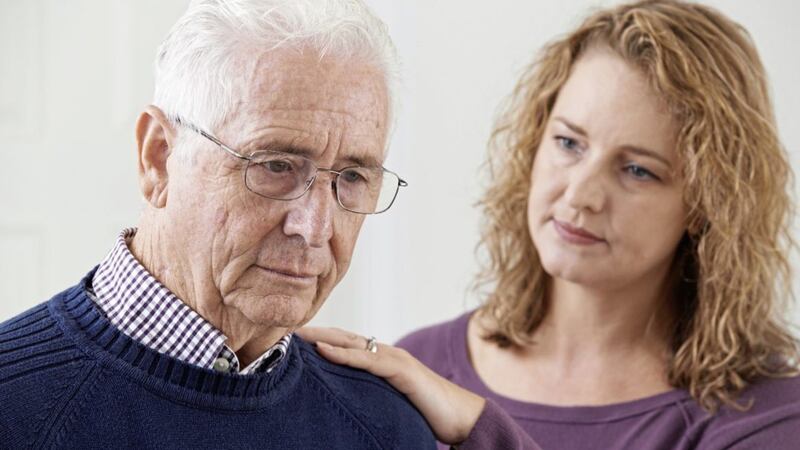WE’RE into Dementia Awareness Week and we’re also in the middle of programmes and articles on depression and mental health. It’s wonderful to know this subject is being aired widely and people are being educated to the awful lives some suffers and their carers are living.
In the last week I’ve met so many people affected in this way. A vibrant young woman surprised me when she admitted she had severe depression in 2011, the result of different traumas in her life, usually around relationships.
“I didn’t feel well; at times I didn’t want to live on. I went back to stay with my parents for two weeks that turned into 10 weeks! I had counselling and gradually began to repair.”
Another older woman called at the house on Thursday and I told her I was writing on this subject and again she surprised me: she also suffers depression and at times feels in despair. Her faith helped her restore a more even keel but she is well aware it’s always hovering. I’m amazed how many people I’ve met in the past few days who admit to a mental health issue. Depression, said one girl, "is like being in a washing machine and looking out at life through the round window and seeing people getting on with their lives as I am out of control".
Another woman told me about her experience. An apparently happy couple loved to go out to people’s homes or to have people to their home, the barbecue on during the good weather and her husband the very centre of all the laughter and wisecracking. When everyone left it was a different matter; the shutters came down. He poured himself more drink and stopped talking, sitting sometimes with his head in his hands. It was a long time before she realised there was something going on that wasn’t just a surly nature and a lack of love for her. He was seriously depressed. Life is hard for them both.
One local initiative is offering sufferers and their friends and families something positive to enjoy. The Grand Opera House Studio is showing two dementia-friendly films and an introductory workshop on digital photography as well as providing dementia-awareness training to members of the theatre staff.
On Tuesday May 16 at 11.30am the theatre is showing Calamity Jane, and on Thursday May 18 at 11.30am the film Brooklyn will be screened in a safe environment, lowered lights, adverts removed and the audience welcome to move around as they like.
:: For more information www.goh.co.uk
Well done to sportsmen in the public eye who are coming forward to talk about their experiences. Rickey Hatton was once a world champion boxer but depression hit and he spiralled down to the depths of drink and drugs, partying non-stop but instead of escaping his demons, it made life worse.
He had suicidal thoughts, lost his family, then began a new relationship, is better than he was but still has ongoing depression.
Football pundit and former player Robbie Savage talks of his father’s Alzheimer’s, how his mentor didn’t even recognise him – he was in his own little world yet there was nothing to show; he staggered as if drunk, slurred his words, would be irritable and people criticised him but no-one knew the real reason because you can’t bandage a mental health issue or put it in a plaster cast.
Despite sitting with a man who didn’t know him, Robbie kept visiting, then one day he didn’t and that day, his father died. Now he lives with this guilt.
Freddie Flintoff was terribly criticised for his drunken antics after the Cricket World Cup when the English team came home to great celebrations following their win. But Freddie was trying to escape depression in a bottle and being Jack the Lad, when in fact on some days he cried, couldn’t get out of bed, didn’t want to walk out on to the field, let alone play; he wanted a doctor to tell him what was going on. No-one, let alone himself, ever thought of depression.
He despises people who say ‘look at the fortune he’s made, his is a blessed lifestyle, is he trying to get sympathy?’ He asks people to look behind the facade of success or failure and discover the person. And to those one in four who are experiencing depression he says very definitely: Talk about it; you’ll be surprised how common it is and how people won’t judge you but help you in whatever why they can.
Seek advice and help. And you’ll be surprised how many identify with your condition.
More details from Alzheimers Society; Northern Ireland telephone number 028 9066 4100 9am-5 pm; UK-wide helpline 0300 222 1122.
THEATRE AT THE MILL
TONIGHT sees the first of six plays that make up the 65th Ulster Drama Festival. Bangor Drama Club, Clarence Players, Holywood Players, Rosemary Drama, Theatre 3 Newtownabbey and Wexford Drama Group. A feast of theatre will culminate on Saturday with the adjudication by Paul Fowler GODA.
:: Details at www.theatreatthemill.com
GET IN THE PICTURE
And next weekend is the 50th Anniversary of the NI Photographic Association with celebrations at the Marine Court hotel in Bangor. There will be internationally recognised photographers, a competition and an outing to Mountstewart. The highly respected nature photographer Pete Cairns of Northshots Photography will certainly draw the enthusiast. I worked with him once in his beloved Scottish Highlands and I look forward to meeting up with him again.
:: More deals at www.niphoto.co.uk









